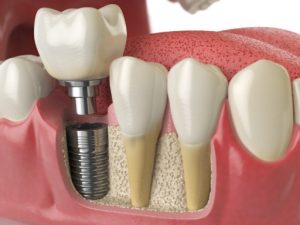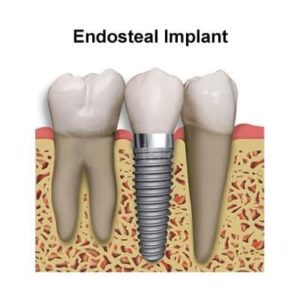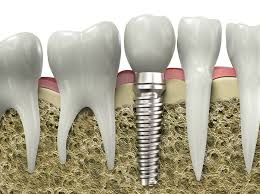
Happy Smile Dental clinic is one of the Best Dental Implant Clinic in Chennai. It is located heart of the city in T.Nagar.
What are Dental Implants
A dental implant (also known as an endosseous implant or fixture) is a surgical component that interfaces with the bone of the jaw or skull to support a dental prosthesis such as a crown, bridge, denture, facial prosthesis or to act as an orthodontic anchor. The basis for modern dental implants is a biologic process called osseointegration, in which materials such as titanium form an intimate bond to bone. The implant fixture is first placed so that it is likely to osseointegrate, then a dental prosthetic is added. A variable amount of healing time is required for osseointegration before either the dental prosthetic (a tooth, bridge or denture) is attached to the implant or an abutment is placed which will hold a dental prosthetic/crown.
When is implant suggested?
Dental implants can be used to replace a single tooth, several teeth, or all of the teeth. The goal of teeth replacement in dentistry is to restore function as well as esthetics.
When it comes to tooth replacement, generally, there are three options:
- removable dental appliance (complete denture or partial denture),
- fixed dental bridge (cemented), and
- dental implant.
Dentures are the more affordable option for replacement teeth but are the least desirable because of the inconvenience of a removable appliance in the mouth. Furthermore, dentures can affect one’s taste and sensory experience with food.
Dental bridgework was the more common restorative option prior to the relatively recent shift to dental implant treatment. The main disadvantage to bridgework is the dependence on existing natural teeth for support. Implants are supported by bone only and do not affect surrounding natural teeth. Deciding on which option to choose depends on many factors. Specifically for dental implants, these factors include
- location of missing tooth or teeth,
- quantity and quality of the jawbone where the dental implant is to be placed,
- health of the patient,
- cost, and
- patient preference.
A dental surgeon examines the area to be considered for the dental implant and makes a clinical assessment of whether the patient is a good candidate for a dental implant.
There are great advantages to choosing a dental implant for tooth replacement over the other options. Dental implants are conservative in that missing teeth can be replaced without affecting or altering the adjacent teeth. Furthermore, because dental implants integrate into the bone structure, they are very stable and can have the look and feel of one’s own natural teeth.
Types of Dental implants
Historically, there have been two different types of dental implants:
- Endosteal.
- Subperiosteal.
 Endosteal refers to an implant that is “in the bone,” and subperiosteal refers to an implant that rests on top of the jawbone under the gum tissue.
Endosteal refers to an implant that is “in the bone,” and subperiosteal refers to an implant that rests on top of the jawbone under the gum tissue.
 Subperiosteal implants are no longer in use today because of their poor long-term results in comparison to endosteal dental implants.
Subperiosteal implants are no longer in use today because of their poor long-term results in comparison to endosteal dental implants.
While the primary function of dental implants is for teeth replacement, there are areas in which implants can assist in other dental procedures. Due to their stability, dental implants can be used to support a removable denture and provide a more secure and comfortable fit. In addition, for orthodontics procedures, dental mini-implants can act as temporary anchorage devices (TAD) to help move teeth to a desired position. These mini-implants are small and temporarily fixed to bone while assisting in anchorage for teeth movement. They are subsequently removed after their function has been served.
For patients who have lost all their teeth due to decay or gum disease of the upper and/or lower arch, an option is available to provide a very stable and comfortable prosthesis using a minimal number of implants. One such is example is the “All-On-4” technique that was named by implant manufacturer Nobel Biocare. This technique gets its name from the idea that four implants can be used to replace all teeth in a single arch (upper or lower). The implants are strategically placed in areas of good strong bone, and a thin denture prosthesis is screwed into place. The All-On-4 technique provides teeth replacement that is stable (not removable) and feels like natural teeth compared to the older method of traditional (removable) complete dentures. Without a doubt, implant dentistry has allowed for more treatment options to replace single and multiple missing teeth with long-term stability and contributes to improved oral health.
Risks
With any surgery, there are always some risks and potential complications to the patient or to the success of a dental implant. Careful planning is important to ensure that a patient is healthy enough to undergo oral surgery and heal properly. Just like any oral surgery procedure, bleeding disorders, infections, allergies, existing medical conditions, and medications need careful review prior to proceeding with treatment. Fortunately, the success rate is quite high and failures usually occur in the unlikely event of infection, fracture of the dental implant, overloading of the dental implant, damage to the surrounding area (nerves, blood vessels, teeth), poor positioning of the dental implant, or poor bone quantity or quality. Again, careful planning with a qualified surgeon can help avoid these problems. In many cases, another attempt can be made to replace a failed dental implant after the requisite time for healing has taken place.
Is it painful?
- Dental implant surgery is usually performed under local anesthetic, and therefore, no pain should be felt during the procedure.
- After the local anesthetic has worn off, the post-surgery discomfort will vary with each individual case.
- However, in general, most people will feel discomfort similar to a tooth extraction afterward.
- A cold ice pack is placed on skin over the area of surgery immediately after treatment to help reduce swelling.
- This pain typically can be managed with over-the-counter pain medications.
- More invasive surgery may require a stronger prescription pain medication and more recovery time.
- Aside from pain medications, prescriptions for antibiotics and oral rinses may be needed to support healing of the area for the following few weeks.
Follow-up
- Dental implants have the risk of developing a condition called “peri-implantitis,” which is the equivalent of periodontal (gum) disease for natural teeth. This refers to inflammation of the gum and bone surrounding the implant.
- The inflammation of the surrounding tissues is often due to excessive biting forces on the implant or bacterial infection.
- Peri-implantitis can result in the loss of an implant if left untreated.
- After getting a dental implant, routine maintenance care at home and follow-up at the dental office are essential in avoiding this condition.
- Good oral hygiene for a dental implant at home involves routine brushing and flossing to keep food debris and plaque away.
- In the dental office, the surrounding soft and hard tissues are examined and special tools are used to remove harder calcified deposits around the dental implant.
- If needed, the bite is adjusted to ensure that the implant does not sustain heavy biting forces.











